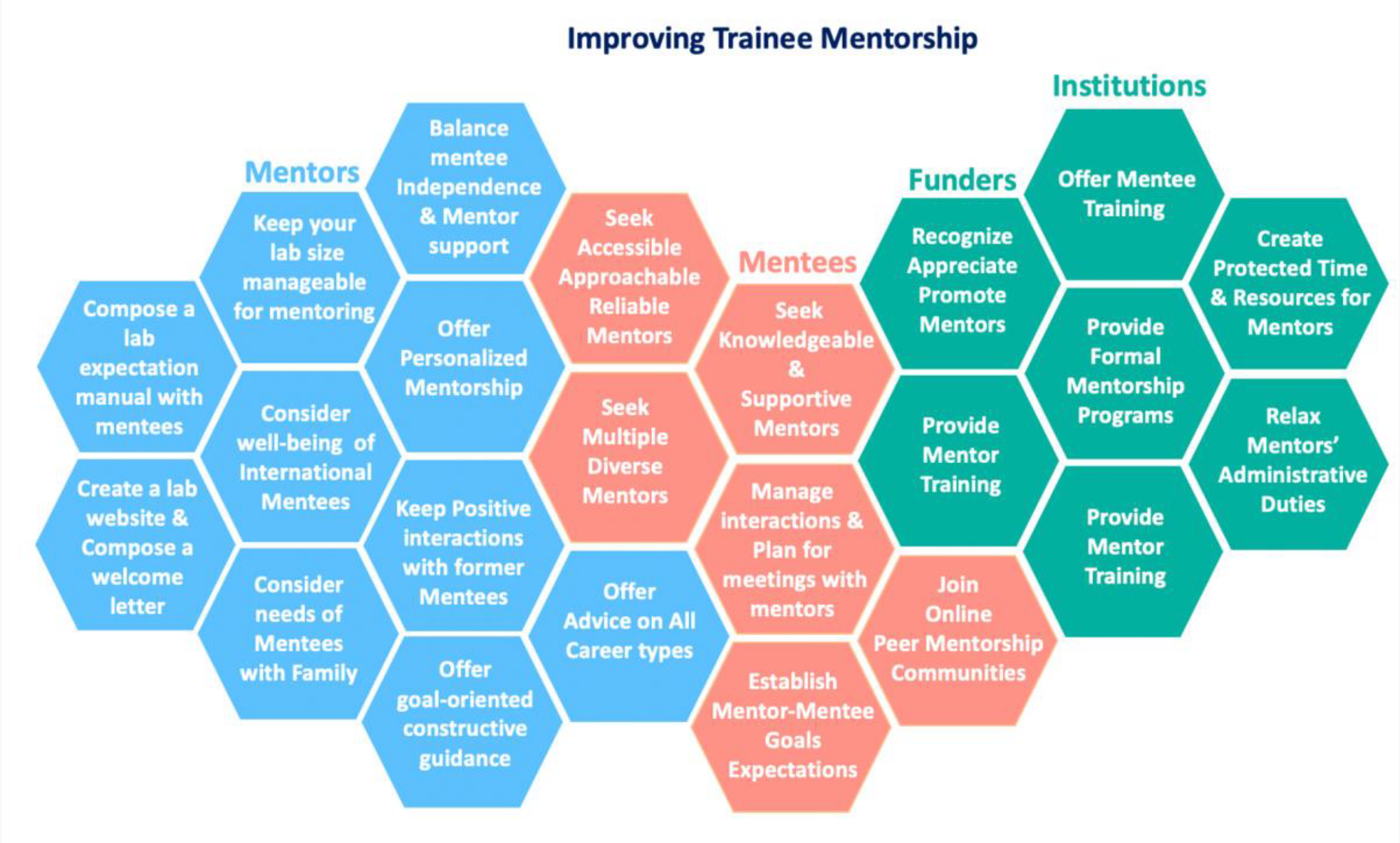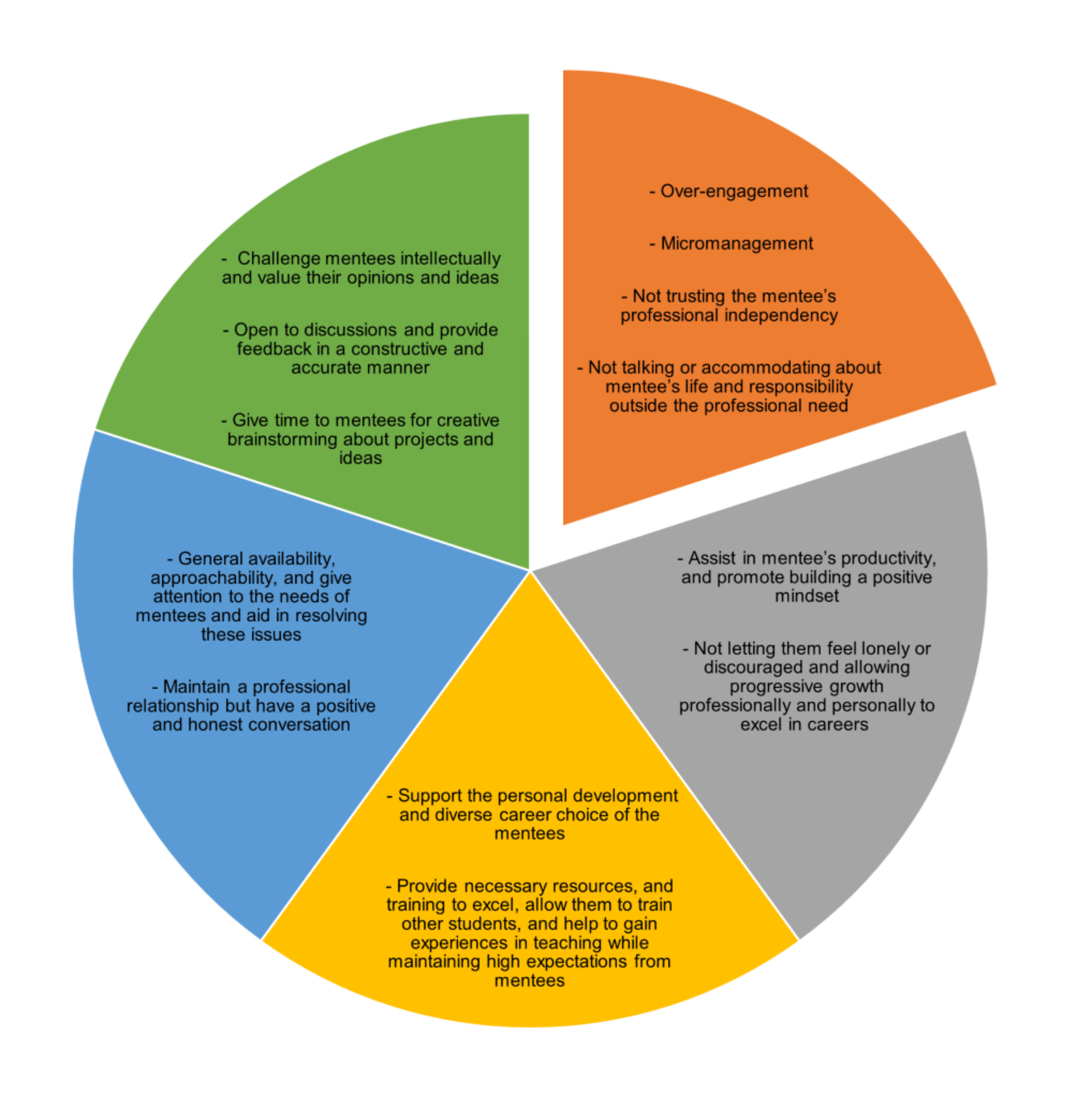Insights from a survey of mentorship experiences by graduate and postdoctoral researchers
Posted on: 17 May 2023
Preprint posted on 8 May 2023
Be the helping hands for the future leaders in science: a guide to being a better mentor.
Selected by Chee Kiang Ewe, Kanika Khanna, Aniruddha Das, Juan MorianoCategories: scientific communication and education
This article is co-written by Reinier Prosee, preLights Community Manager
Background
Mentorship can make or break an academic career. Often, mentorship is provided by a single mentor, e.g. the principal investigator (PI) of a lab, whose role is to guide a less experienced mentee, e.g. a PhD student or postdoc, through the jungle that is academia. In this ‘single mentor model’, it is perhaps unsurprising that the quality of mentorship varies considerably. Poor mentorship can result from many different things, but often boils down to a misalignment in mentorship expectations.
There is a lack of data and guidelines that can direct mentor-mentee interactions in academia. Hence, the authors of this preprint set up a large, international study – with over 2,000 participants – to describe mentoring relationships as experienced by mentees working in STEM. Collecting this information can inform new mentoring strategies, but also new policies at the level of departments, funders, and institutions. The findings reported in this preprint paint an alarming picture and should be a call to action – thankfully the preprint authors provide a framework to improve the current situation.
Key Findings
In this study, the authors distributed an English Google form on social media and network platforms, between March 2019 and March 2020, which included scaled responses and open-ended questions. The responses were optional and voluntary, and all data was obtained while assuring the anonymity of the participants.
By surveying 2114 trainees from 66 countries spanning six continents, the authors found that while most trainees (70%) are satisfied with the mentorship that they receive, a substantial fraction of them believe their mentorship could be improved. The authors further uncovered that international women trainees expressed higher dissatisfaction with regard to their mentorship experience, highlighting gender and nationality bias in academia. Below, we summarize the common mentorship pitfalls, as well as actionable steps for mentors, departments, institutions, and funding agencies to improve mentorship practices for trainees in STEM, that were reported in this preprint (Figure 1).
 Figure 1: Framework to improve mentorship practices. Modified from Sarabipour et. al. 2023
Figure 1: Framework to improve mentorship practices. Modified from Sarabipour et. al. 2023
What are some common mentorship challenges in an academic environment? Trainee mentees listed some common mentoring woes:
- To begin with, some trainees were unaware of the concept of mentorship and what to expect of a mentor-mentee relationship, reinforcing the need for training trainees to seek and manage mentorship interactions.
- Many trainees reported that they did not receive an appropriate level of mentorship. In some cases, mentors were inaccessible due to their absence or the large number of trainees they had to manage. In other cases, mentors exhibited micromanagement tendencies that hindered the independent growth of mentees.
- Some trainees, especially those from international backgrounds, expressed concerns about the power difference between mentors and mentees, which can negatively impact their scientific prospects. Trainees also expressed concerns about some mentors having little regard for work-life balance, mental well-being of trainees and engaging in abusive behaviors and bullying.
- Another prevalent issue reported was that of bias and favoritism, wherein mentors display partiality toward specific groups or individuals in their lab. Such favoritism results in negative mentorship experiences for trainees who do not receive equal opportunities or support.
Certainly, proper mentorship can set up mentees for an impactful and thriving career. What then are the mentorship traits that were found to be the most influential as part of the survey? The authors identified the most valuable mentorship traits, which can be seen in Figure 2.
In summary, the detailed survey revealed that the most desirable and helpful mentorship traits are openness, honest advice, constructive feedback, support, motivation, training, guidance, and the personal interest of mentors. Moreover, the study also indicated that mentees highly appreciate certain qualities in their mentors which include fairness, optimism, value, respect, trust, allowing independence, and supportive behavior.

Figure 2: Ideal mentors possess the following traits marked in light green, light blue, orange, and gray, and be devoid of traits marked in dark orange.
With an understanding of the dynamics of mentor-mentee relationships, the authors put forth actionable recommendations for mentors (Figure 1):
- Provide equal treatment to all trainees and avoid favoritism. That is, allocate a similar amount of time to all on-going projects in the lab, and hold each lab member to the same professional standard appropriate for their career status.
- Understand that people have different backgrounds, motivations, and goals. Provide tailored mentorship that fulfils individual needs and support mentees to develop their unique career trajectory. One way to achieve this is to develop Individual Development Plans (IDPs) with the mentees annually.
- Understand the prevalence of mental health issues among trainees and support them through these struggles. Promote work-life balance in the lab to avoid burnout. Be flexible with meeting times and work schedules. Be aware of and promote the resources for mental health and well-being on campus.
- Set clear expectations for the mentees from the get-go. Create a laboratory handbook which includes, for example, policies for time off, working hours, meeting frequency, etc. to clearly communicate expectations and goals, as well as to promote consistent lab practices. Mentors should also receive regular feedback on the culture within their lab through the use of anonymous surveys.
- Promote a safe and healthy work environment for trainees both inside and outside of the lab. Acknowledge that power dynamics in academia exist and can be manipulated. Inappropriate interactions and behaviors should not be tolerated. See something, say something.
Lastly, the authors suggested two main lines of action to improve mentorship at the level of departments, institutions, and funders (Figure 1):
- Institutional commitment is essential to 1) create a supportive environment where trainees can discuss their mentee-mentor relationships, and 2) account and review the mentors’ dedication and the quality of their mentorship.
- Courses and training on mentorship should be provided to principal investigators so as to increase awareness on best practices and better address the main concerns and expectations of mentees that are so often overlooked. A positive change suggested along these lines would require funding agencies to actively support such activities. Mentees are recommended to seek multiple and diverse mentors.
Limitations
As the authors acknowledged, this large survey was performed before the COVID-19 pandemic. Given its consequences on mental health, personal and professional expectations, it will be extremely interesting to re-evaluate participants after the pandemic, as well as to compare these results to those obtained from new respondents. It will also be important to further expand this study to increase the participants’ geographical diversity and diversity of race or ethnicity.
What we liked about this preprint
In the preprint, the authors provide an in-depth view of the mentoring climate in science across different countries. As postdocs and graduate students, we find many responses in the survey relatable and plead for a cultural change. The authors provide a series of actionable recommendations which should be widely adopted by PIs, departments, institutions, and funders to improve mentorship practices in STEM.
Questions for the authors:
- Students from lower socio-economic backgrounds (e.g., first-generation) often require additional guidance while navigating academia. Do you have data that indicate how these students interact with their mentors?
- Has the data been parsed down to the position of mentors as well? For instance, responses of mentees whether they were talking about the lab of a newly appointed assistant professor vs tenured late-stage professor?
doi: https://doi.org/10.1242/prelights.34753
Read preprintSign up to customise the site to your preferences and to receive alerts
Register hereAlso in the scientific communication and education category:
DNA Specimen Preservation using DESS and DNA Extraction in Museum Collections: A Case Study Report
Daniel Fernando Reyes Enríquez, Marcus Oliveira
Kosmos: An AI Scientist for Autonomous Discovery
Roberto Amadio et al.
Identifying gaps between scientific and local knowledge in climate change adaptation for northern European agriculture
Anatolii Kozlov











 (No Ratings Yet)
(No Ratings Yet)